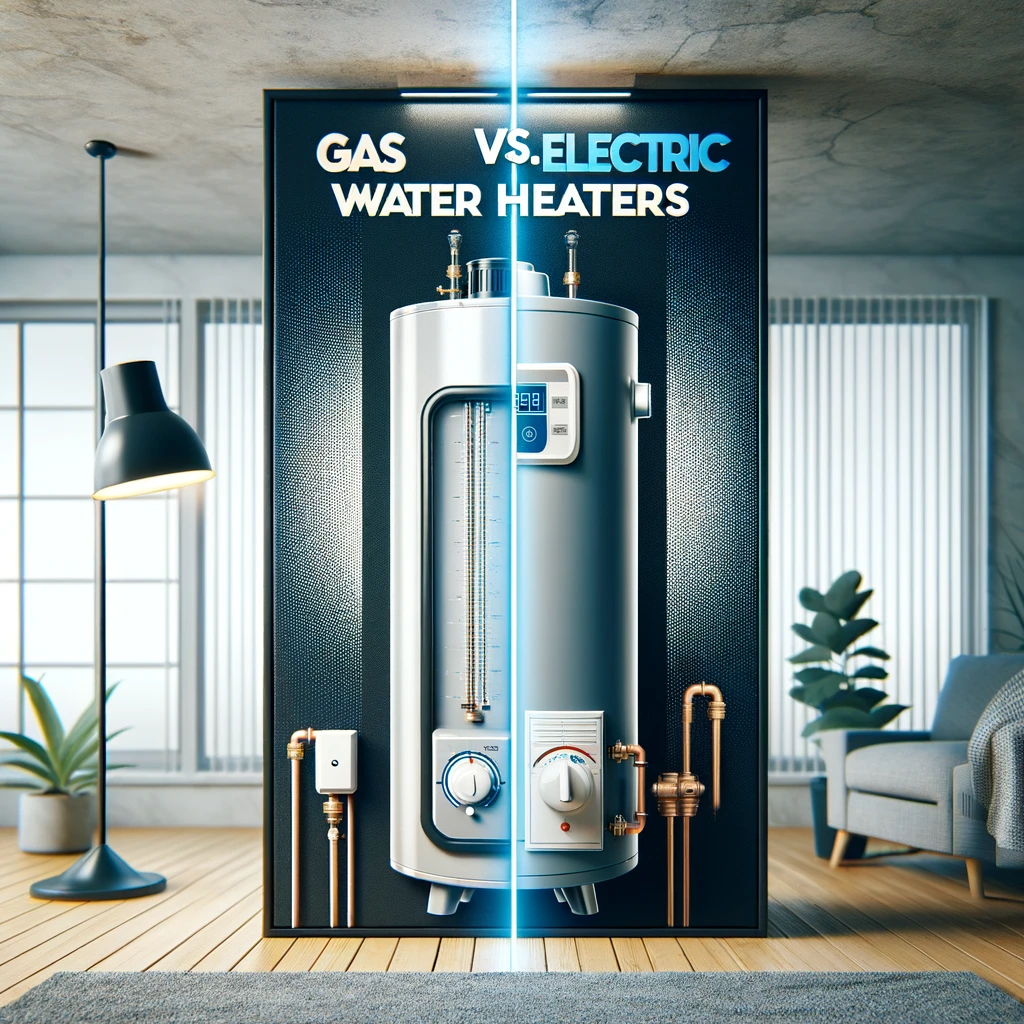
Heating Showdown: Gas vs. Electric Water Heaters In 2024
When it comes to selecting a water heater for your home, the choice between gas and electric models can be a critical decision. Both types have their own set of advantages and disadvantages, and understanding these can help you make an informed choice that suits your needs. This comprehensive guide will delve into the key differences between gas and electric water heaters, examining their efficiency, cost, maintenance requirements, and environmental impact.
Introduction to Water Heaters
Water heaters are an essential part of modern homes, providing the hot water necessary for showers, dishwashing, laundry, and more. The two most common types of water heaters are gas and electric. While both serve the same basic function, their operation and cost-efficiency can differ significantly.
Efficiency and Performance
Gas Water Heaters
Gas water heaters typically heat water faster than electric models. This is because gas burners can achieve higher temperatures quickly, allowing for a faster recovery rate. This means that if you have a large family or use a lot of hot water, a gas water heater might be more suitable.
- Recovery Rate: Gas water heaters have a higher recovery rate compared to electric heaters. This means they can reheat water quicker, which is beneficial during high usage periods.
- Energy Efficiency: Modern gas water heaters are quite efficient, with many models boasting high Energy Factor (EF) ratings. However, they can be less efficient than their electric counterparts due to heat loss through venting.
Electric Water Heaters
Electric water heaters are known for their energy efficiency, particularly in well-insulated tanks that minimize heat loss. These units use electric resistance coils to heat the water, which can be more efficient in some climates.
- Efficiency: Electric water heaters generally have a higher Energy Factor (EF) than gas models, meaning they convert a higher percentage of their energy input into hot water.
- Recovery Rate: The recovery rate for electric water heaters is generally slower than gas models. However, advances in technology have led to more efficient models that can adequately meet the demands of most households.
Cost Comparison
Upfront and Installation Costs
- Gas Water Heaters: Generally, gas water heaters have higher upfront costs and more complex installation requirements, including venting and gas line connections. This can make the initial setup more expensive.
- Electric Water Heaters: Electric models typically have lower upfront costs and simpler installation processes, as they only require an electrical connection. This can be more economical for homeowners on a tight budget.
Operational Costs
- Gas Water Heaters: While the operational cost of gas water heaters can be lower due to the generally lower price of natural gas compared to electricity, these savings can be offset by the higher energy loss during operation.
- Electric Water Heaters: Electric water heaters can be more expensive to operate over time, depending on local electricity rates. However, their higher energy efficiency can sometimes balance out these costs.
Maintenance and Lifespan
Gas Water Heaters
- Maintenance: Gas water heaters typically require more maintenance than electric models. This includes regular inspections of the venting system, checking the gas lines, and ensuring the burner is functioning properly.
- Lifespan: The average lifespan of a gas water heater is about 8-12 years, depending on the maintenance and usage.
Electric Water Heaters
- Maintenance: Electric water heaters are generally easier to maintain, as they have fewer components that can wear out. Regularly checking the heating elements and ensuring the tank is free of sediment can prolong their lifespan.
- Lifespan: Electric water heaters can last slightly longer than gas models, with an average lifespan of 10-15 years.
Environmental Impact
Gas Water Heaters
Gas water heaters have a larger environmental footprint due to the combustion process, which produces greenhouse gases. However, they can be more energy-efficient in certain applications, which can mitigate some of these effects.
- Carbon Emissions: Gas water heaters emit carbon dioxide, contributing to greenhouse gas emissions. This is an important factor to consider for environmentally-conscious consumers.
- Fuel Source: Natural gas is a fossil fuel, and its extraction and transportation can have significant environmental impacts.
Electric Water Heaters
Electric water heaters, especially those powered by renewable energy sources, can be more environmentally friendly. They produce no direct emissions and can be integrated into a home’s green energy system.
- Clean Energy: If powered by renewable energy, electric water heaters can have a minimal environmental impact. This makes them an attractive option for homes with solar panels or other renewable energy sources.
- Efficiency: The higher energy efficiency of electric water heaters can reduce the overall environmental impact, particularly in regions where electricity is generated from renewable resources.
Choosing the Right Water Heater for Your Home
Selecting between a gas and electric water heater depends on various factors, including your hot water demand, budget, and environmental considerations. Here are some key points to help you decide:
- Hot Water Demand: If you have a high demand for hot water, such as a large family or frequent usage, a gas water heater might be more suitable due to its faster recovery rate.
- Budget: Consider both the upfront and operational costs. While gas water heaters may be more expensive to install, they can be cheaper to operate. Conversely, electric models are typically less expensive to install but can have higher operational costs.
- Environmental Impact: If reducing your carbon footprint is a priority, an electric water heater powered by renewable energy might be the best choice. Alternatively, high-efficiency gas models can also be a good option.
Conclusion
In the heating showdown between gas and electric water heaters, there is no one-size-fits-all answer. Each type has its own benefits and drawbacks, and the best choice will depend on your specific needs and circumstances. By carefully considering factors such as efficiency, cost, maintenance, and environmental impact, you can select a water heater that provides reliable performance and aligns with your values.




